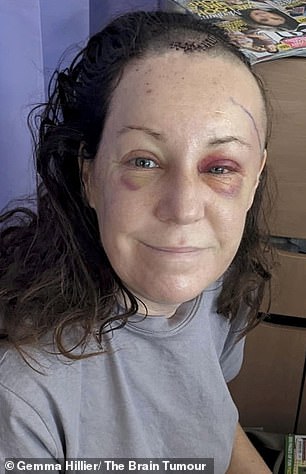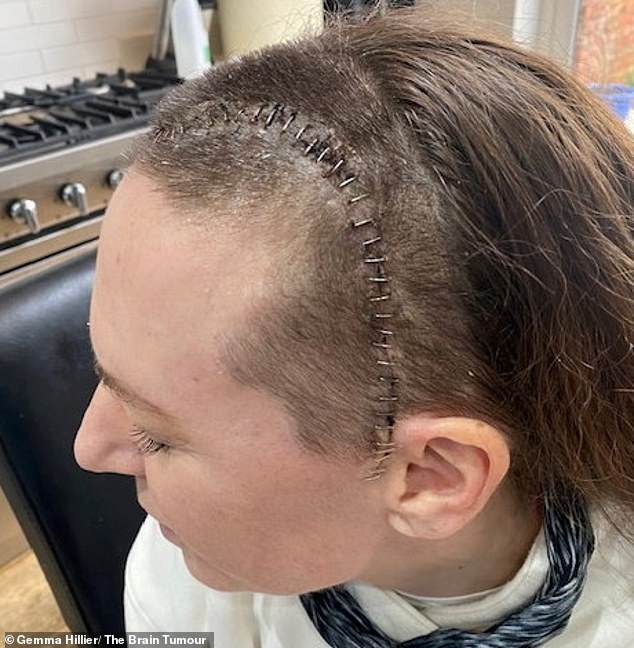Woman with fatal brain tumor urges public never to miss regular check-up that detects her disease
A Northampton woman who was diagnosed with a brain tumor after being unable to read a single letter during an eye test is urging people never to miss an optician appointment.
Gemma Hillier, 45, underwent a standard eye test in September 2023 but was shocked by her poor performance.
The teacher, who thought she could see well, was then referred to an eye clinic for further examination and underwent an MRI scan two months later.
The scan revealed she had a grade 2 meningioma – one of the most common types of brain tumors, which is not cancerous but can be fatal if left untreated.
In February 2024 sUrons at the John Radcliffe Hospital, Oxford removed 90 percent of the tumor, which was wrapped around her optic nerve.
Now she is regularly checked for any growth.
Mrs Hillier, who lost her father Rod, 73, in February 2018 to glioblastoma – the deadliest type of brain tumor – said the disease has “turned her world upside down” over the past six years.
“It’s hard to believe I’m living with a brain tumor,” she said.

Gemma Hillier, 45, (pictured) went to the optician for a routine eye test in September 2023 but was stunned to discover she could not read the letters in front of her. The teacher (pictured after surgery on the right) who thought she could see well was referred to an eye clinic for further examination and in November 2023 she had an MRI scan, which showed she had a benign brain tumor
‘Doctors said I could live with it for years. I could have had it when my dad had his.
‘I’m lucky in some respects; I have a brain tumor, but I can live with it.’
Mrs Hillier experienced no symptoms until she went to the local optician for a check-up.
Recalling the appointment, she said, “When I sat in the chair, I couldn’t read a single letter. I found this strange because I thought I could see well.
‘I had more tests afterwards, including a visual field test, but I failed that.’
After being referred to the eye clinic, Ms Hillier said she went ‘back and forth’ with NHS specialists, so she went privately to an ophthalmologist who referred her for an MRI scan.
She said: ‘I ended up going to a private ophthalmologist who noticed something was wrong just five minutes into the appointment and sent me for an MRI.

After being referred to the eye clinic, Ms Hillier said she went ‘back and forth’ with specialists, so she went privately to an ophthalmologist who referred her for an MRI scan

Ms Hillier said it is ‘crazy’ to live knowing she has a brain tumor but she considers herself lucky
‘Four days after the MRI I received the call that they had found a brain tumor.
“In some ways I felt relief. I kept thinking that I was imagining the symptoms I was having, like a headache for example, which was getting worse and worse.”
Mrs Hillier was told that surgery was her only option to save the sight in her right eye, where the tumor was growing.
“I spent time in the same intensive care unit where my father was six years ago,” she said.
‘I then had many months off work to recover from the operation and get myself fit and healthy again.’
After her surgery, she was told that her tumor was a grade 2 meningioma and that she would need regular follow-up scans to monitor its growth.
According to The Brain Tumor Charity, meningiomas are common, accounting for 27 percent of all diagnosed brain tumors.
Although uncommon, they can be life-threatening if left untreated and can invade and damage other parts of the brain.
Meningiomas can start anywhere in the brain and spinal cord, and symptoms depend on where the tumor is located.
Symptoms can include headaches, vision changes, hearing loss, seizures, and weakness in your arms and legs — but some meningiomas don’t cause any symptoms, Cancer Research explains.
Mrs Hillier said: ‘I have been told by my surgeon that if it grows I will need radiotherapy.
‘The past year has been difficult both physically and mentally.
‘But I know I’m one of the lucky ones. It could have been so much worse, just like it was for my father.”
The NHS recommends that adults have their eyes tested at least every two years. But anyone who notices a change in their vision should also make an appointment.
Brain tumors can be spotted during routine optician appointments, even before noticeable symptoms appear, explains The Brain Tumor Charity.
